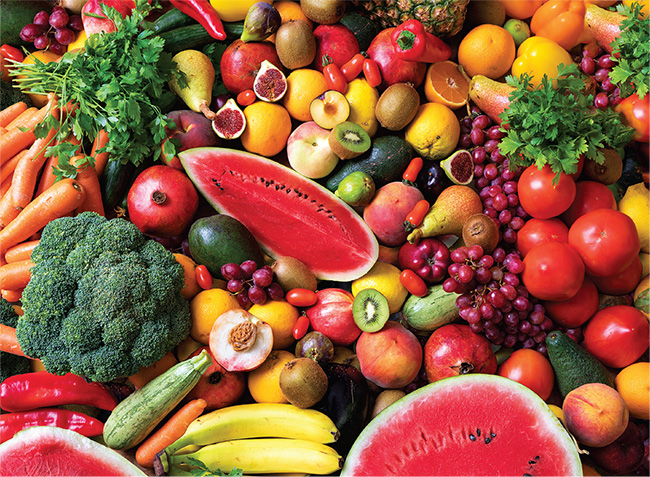DID YOU KNOW?
Diet, lifestyle and environmental toxins contribute to oxidative stress which occurs when there is an imbalance between free radicals and beneficial antioxidants in the body. Oxidative stress may result in accelerated aging, chronic health problems, and may also contribute to the breakdown of dopaminergic neurons in Parkinson’s disease. The key micronutrients to offset oxidative stress are found in colorful fruits and vegetables and include vitamin E, vitamin C and beta-carotene. These
antioxidants cannot be produced by the body and must be consumed in the diet.
NUTRITION TIPS AND TRICKS
Vitamin C
Vitamin C is found in citrus fruits and some vegetables:
- Oranges and orange juice
- Peppers
- Strawberries
- Blackcurrants
- Broccoli
- Brussels sprouts
- Potatoes
Vitamin E
Vitamin E is found in seeds, nuts, plant-based oils, some fruits and vegetables.
Good sources include:
- Wheat germ oil
- Nuts/seeds and nut butters from almonds, peanuts and sunflower seeds
- Avocado/avocado oil
- Asparagus, mangos
- Spinach, beet greens, collard greens
- Pumpkin
- Red bell pepper
Beta-carotene and Carotenoids
The most common carotenoids are beta-carotene, lycopene, lutein, and zeaxanthin. Carotenoids are found in brightly colored yellow, orange, red and green fruits and vegetables:
- Carrots
- Winter squash/pumpkin
- Canteloupe
- Orange and red bell peppers
- Tomatoes
- Watermelon
- Pink grapefruit
- Broccoli
Beta-carotene and carotenoids are fat soluble meaning they need fat for absorption, so pair them with some extra virgin olive oil, avocado, seeds or nuts for best absorption. Other beneficial antioxidants called flavonoids, tannins, phenols and lignins can be found in colorful fruits, vegetables, whole grains, seeds, nuts, herbs and spices.
Including a variety of colors every day ensures that antioxidants are abundant in your diet.
Clean Up Your Diet
- Consume whole foods in their natural state by limiting processed foods with additives, preservatives and dyes.
- Eat bright, colorful fruits and vegetables to get important antioxidants to fight free radical damage.
- Avoid processed foods.
- Avoid too much sugar.
- Limit salt/sodium intake.
REFERENCES
Pajares M, I Rojo A, Manda G, Boscá L, Cuadrado A. Inflammation in Parkinson’s Disease: Mechanisms and Therapeutic Implications. Cells. 2020 Jul 14;9(7):1687. doi: 10.3390/cells9071687.PMID: 32674367; PMCID: PMC7408280.
Mischley LK, Lau RC, Bennett RD. Role of Diet and Nutritional Supplements in Parkinson’s Disease Progression.Oxid Med Cell Longey, 2017:2017:6405278. doi: 10.1155/2017/6405278. Epub 2017 Sep 10. PMID: 29081890; PMCID: PMC5610862.
(REF: https://www.health.harvard.edu/newsletter_article/ask-the-doctor-what-is-inflammation)
